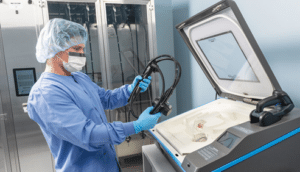 With infectious diseases in the spotlight due to the recent surge of Covid-19 in the United States, hospitals must do all they can to ensure the highest levels of effectiveness of their disinfection and sterilization protocols. With this in mind, hospitals need to re-examine their endoscope reprocessing protocols to ensure they meet the highest standards, thereby reducing the potential for a superbug outbreak.
With infectious diseases in the spotlight due to the recent surge of Covid-19 in the United States, hospitals must do all they can to ensure the highest levels of effectiveness of their disinfection and sterilization protocols. With this in mind, hospitals need to re-examine their endoscope reprocessing protocols to ensure they meet the highest standards, thereby reducing the potential for a superbug outbreak.
A recent article published by Dr. Michelle Alfa, a professor of Infectious Disease at the University of Manitoba, examines systematic changes sterile processing departments can make to improve the quality of their endoscope reprocessing protocols. As this article by Gina Shaw at Gastroenterology and Endoscopy News explains:
“In terms of reprocessing flexible endoscopes, endoscopy clinics cannot keep doing the same thing and expect a different outcome,” wrote Alfa, a professor in the Department of Medical Microbiology and Infectious Diseases at the University of Manitoba, in Winnipeg. “The key question is, ‘What needs to change?’ It is difficult to identify effective changes in endoscope reprocessing because currently there is no monitoring being performed!”
She cited an April 2019 interim FDA statement, which found that up to 5.4% of collected samples tested positive for organisms such as Escherichia coli and Pseudomonas aeruginosa, with an additional 3.6% contaminated with organisms of low to moderate concern. The agency had expected contamination rates to be less than 1%, Alfa noted.
To make reprocessing easier and reduce the risk for infection, the FDA recently recommended that endoscopy centers transition to duodenoscopes with innovative designs, such as disposable or removable endcaps, that allow them to be reprocessed more effectively. The agency also recommended that centers institute quality assurance programs that include sampling and culturing of duodenoscopes as well as other monitoring methods.
“One of the driving forces behind this article was the fact that multiple recent studies have drawn attention to problems with endoscope drying efficacy and the value of the alcohol flush,” Alfa told Priority Report.
“Many people believe automated endoscope reprocessors are doing an adequate job, but the data shows that is not the case. That led my co-author Dr. Harminder Singh and myself to recognize the need to put all of the latest information about endoscope reprocessing together into one review that emphasizes the need for quality systems approaches, and the fact that right now we fall, sadly, very short of that goal. The data is out there, but people hadn’t really put it all together.”
…The review noted that data collected via regular monitoring of quality management systems can facilitate important changes to a center’s processes, such as:
- reducing the use of off-label products that cannot be removed effectively by the cleaning steps specified in manufacturers’ instructions;
- improving transit time between patient use and cleaning;
- optimizing efficacy of manual cleaning before HLD;
- culturing to reduce the risk for infection transmission due to contaminated scopes; and
- ensuring adequate drying before storage.
This last point, Alfa said, is another key gap for many institutions. “It continues to go unrecognized that automated endoscope reprocessors do not have adequate drying before scopes go in the storage cabinet,” she said. The Gastroenterological Society of Australia (TGA) recommends that endoscopic equipment be stored in TGA-approved forced air-drying cabinets, which provide proven additional protection from bacterial biofilm, and Alfa said she believes that North American programs should do the same.”
Read the entire article here: A Quality Systems Approach To Scope Reprocessing
As the article points out, the infection risk with high-level disinfected endoscopes continues to be a major source of concern for hospitals. Facilities must ensure staff are trained on general infection control principles and must adhere to reprocessing best practices, and they must be prepared to constantly monitor and improve their practices. To ensure that your staff is following reprocessing best practices on every scope they disinfect or sterilize, install additional checks and balances into your workflow so that you can document that your staff is following the same process each time. Endoscope tracking systems such as iRIScope have been introduced in recent years to help hospitals and surgery centers ensure that each of their flexible endoscopes is reprocessed the proper way each time, and documentation of their reprocessing is kept electronically using advanced RFID technology. These systems safeguard the scope disinfection process by employing artificial intelligence to determine if scopes are adequately reprocessed before their next use. With these systems in place, staff can be more confident that their endoscope-related procedure won’t result in a superbug outbreak.
